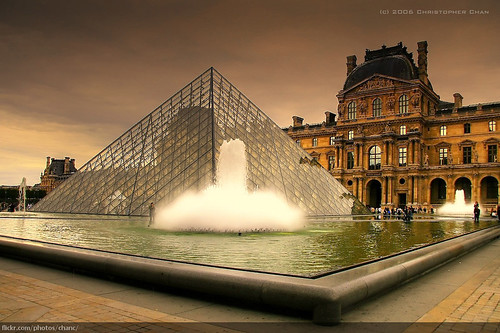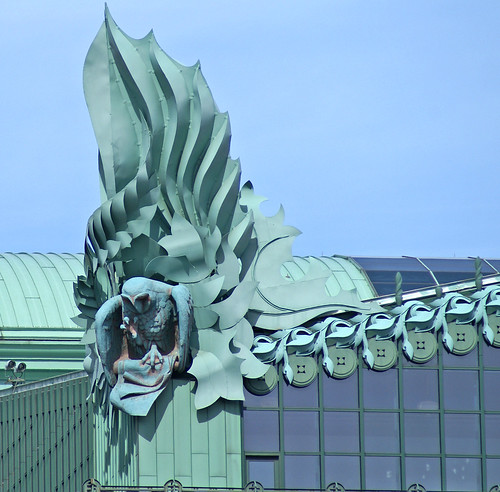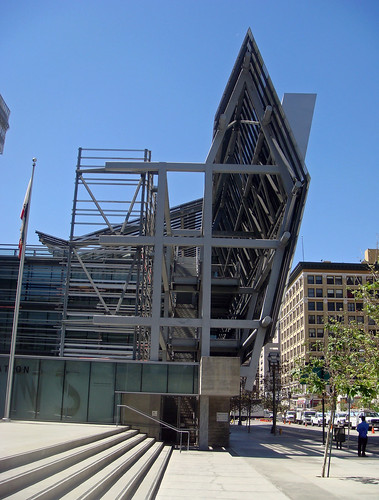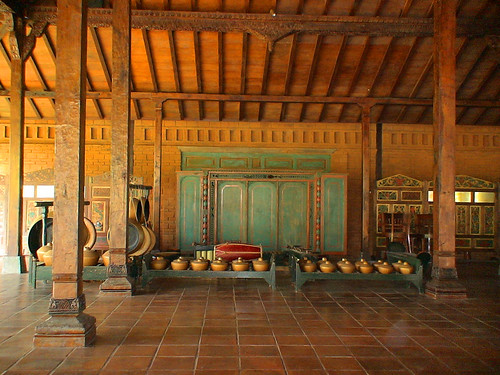 Beberapa waktu lalu, saya dihubungi oleh Mbak Raya dari Koran Seputar Indonesia untuk wawancara tentang arsitektur postmodern. Tampaknya, media arsitektur yang mengulas arsitektur bagi khalayak umum juga mulai tertarik dengan istilah ini. Meskipun pertanyaan yang diajukan seputar hubungannya dengan arsitektur yang dikenal masyarakat, menurut saya justru disini letak dari korelasi yang mendasar dari keingintahuan masyarakat dengan gerakan filsafat dan arsitektur yang seringkali masih terasa jauh dari pemahaman yang sebenarnya.
Beberapa waktu lalu, saya dihubungi oleh Mbak Raya dari Koran Seputar Indonesia untuk wawancara tentang arsitektur postmodern. Tampaknya, media arsitektur yang mengulas arsitektur bagi khalayak umum juga mulai tertarik dengan istilah ini. Meskipun pertanyaan yang diajukan seputar hubungannya dengan arsitektur yang dikenal masyarakat, menurut saya justru disini letak dari korelasi yang mendasar dari keingintahuan masyarakat dengan gerakan filsafat dan arsitektur yang seringkali masih terasa jauh dari pemahaman yang sebenarnya.
Unsur simbolisme dan metafor yang seringkali hadir dalam arsitektur Post Modern
Pertanyaan seputar dunia postmodern memang agak susah dipahami. Karena konsep ini sangat mendalam dan bila dijelaskan bisa satu buku sendiri. Ada ahli-ahli teori dalam dunia akademisi yang lebih tau dari saya sebenarnya. Karena itu, silahkan berkomentar bila sekiranya ada pendapat saya yang kurang selaras dengan teorinya.
Apa definisi dari post modern? Tolong jelaskan ?
Untuk mengerti tentang Postmodernisme, kita harus mengerti tentang 'modernisme', karena pada dasarnya postmodern adalah gerakan kritis terhadap 'modern'. Arsitektur modern adalah jenis arsitektur yang mendasarkan diri pada fungsi, tiadanya ornamentasi, dan penghilangan unsur-unsur dekoratif yang tidak perlu. Contohnya: arsitektur minimalis murni adalah jenis arsitektur modern yang berkembang. Arsitektur seperti ini tidak mengakomodasi elemen dekoratif, simbolik ataupun tradisional.Postmodernisme adalah sebuah gerakan berdasarkan pandangan kritis atas gerakan modern yang dirasa tidak lagi manusiawi atau dapat menyelesaikan problem-problem dalam dunia modern itu sendiri. Dalam arsitektur menjadi sebuah gerakan baru untuk memberikan keleluasaan bagi berbagai faktor rancangan yang tidak pernah tercakup sebelumnya dalam arsitektur modern agar bisa muncul dan terakomodasi.
Postmodernisme bukanlah sebutan akan gaya arsitektur belaka, tapi lebih jauh dari itu, merupakan gerakan filsafat dan moral yang patut dicermati sebagai bagian dari kritik terhadap teori arsitektur modern yang cenderung meniadakan unsur-unsur yang manusiawi seperti simbolisme, dekorasi, dan hal-hal yang sifatnya non fungsional. Hal ini karena arsitektur modern yang kaku dan mendasarkan diri pada fungsi dirasa tidak dapat memberi solusi bagi keinginan manusiawi untuk lebih bebas berekspresi.

Ekspresi yang cenderung berlebih dalam konstruksi yang dibuat menjadi dekorasi, yang selalu dianggap tidak fungsional dan dekoratif biasanya diabaikan dalam arsitektur modern.
Bila kita tarik ke Indonesia, maka filsafat postmodernisme akan lebih dapat diterapkan karena pada dasarnya masyarakat kita sangat menyukai pembebasan bentuk-bentuk yang sifatnya dekoratif dan simbolik, misalnya: meskipun gaya rumah atau apartemen yang digunakan modern, tapi seringkali menggunakan ornamentasi atau dekorasi, dan banyak elemen yang sifatnya simbolik, misalnya: kepercayaan terhadap petungan Jawa, atau Feng Shui. Contoh lainnya, meskipun gaya arsitektur yang digunakan adalah 'gaya minimalis', tapi sebenarnya masih banyak ornamentasi yang dicoba untuk ditampilkan, misalnya dekorasi lis profil. Dalam arsitektur 'modern' yang murni, hal seperti dekorasi atau simbolisme itu tidak boleh ada.

Untuk mengangkat kembali nilai-nilai arsitektur tradisional, bisa dilakukan kedalam arsitektur yang berkonstruksi modern untuk mencapai nilai-nilai yang dipahami dalam dunia modern
Ciri-ciri arsitektur post modern? Sebutkan dan beri contoh? Bagaimana dengan bentuk atapnya? Pilarnya? Apa yang ditonjolkan dalam gaya post modern?
 Dalam bicara postmodern, secara dangkal kita bisa mengkaitkannya dengan bentuk bangunan seperti bentuk atap, penggunaan pilar, atau ornamentasi. Bahkan bentuk-bentuk yang aneh seperti Plaza Ex juga bisa disebut postmodern. Tapi kita tidak bisa melihatnya dengan pengertian yang dangkal, bila ingin memahami postmodern.
Dalam bicara postmodern, secara dangkal kita bisa mengkaitkannya dengan bentuk bangunan seperti bentuk atap, penggunaan pilar, atau ornamentasi. Bahkan bentuk-bentuk yang aneh seperti Plaza Ex juga bisa disebut postmodern. Tapi kita tidak bisa melihatnya dengan pengertian yang dangkal, bila ingin memahami postmodern.Left image source from archiwork.net
Betul bahwa metode akomodasi bentuk-bentuk elemen tradisional atau simbolisme dapat digolongkan menjadi metode desain dalam postmodernisme, tapi bukan berarti semua yang mengandung atap tradisional atau aneh, pilar gaya Romawi, dan sebagainya bisa langsung disebut sebagai Postmo. Tanpa adanya pengertian mendasar tentang postmodernisme, maka hasil karya seorang arsitek boleh jadi terlihat seperti postmodern, tapi sebenarnya ia adalah bagian dari gerakan yang harus dikritisi kembali bila metodenya tidak mendasar.
Ciri-ciri arsitektur postmodern adalah mengakomodasi fungsi dan bentuk yang dirasa perlu untuk hadir dalam rancangan, misalnya arsitektur tradisional, simbolisme, dekorasi, dan sebagainya. Misalnya, bila arsitektur sebuah bangunan itu penuh dengan garis-garis tumpang tindih seperti sarang burung... boleh jadi sang arsitek sedang mengakomodasi bentuk sarang burung dalam bangunannya. Bila dalam desain bangunan terdapat pilar gaya Romawi atau pilar gaya Jawa, tapi menggunakan konstruksi modern, boleh jadi sang arsitek sedang mengakomodasi bentuk ornamentasi dan budaya Romawi atau Jawa dalam bangunannya.
apakah ada contoh bangunan di Indonesia bergaya post modern? Jika ada beri contoh?
 Bangunan tinggi bergaya Mediterania, Romawi klasik, atau Jawa (bila ada) adalah contoh dari bangunan postmodern. Meskipun disini, sekali lagi kita tidak bisa menjamin bahwa arsiteknya sendiri mengerti tentang konsep postmodernisme.
Bangunan tinggi bergaya Mediterania, Romawi klasik, atau Jawa (bila ada) adalah contoh dari bangunan postmodern. Meskipun disini, sekali lagi kita tidak bisa menjamin bahwa arsiteknya sendiri mengerti tentang konsep postmodernisme.Left image source from www.sewa-apartemen.net
patokan atau pakem untuk membuat bangunan post modern? Apa yang harus dipikirkan dan dilakukan?
Tidak ada pakem atau patokan khusus dalam dunia desain postmodernisme. Yang ada adalah pandangan bahwa disamping fungsi bangunan, kita masih dan sebaiknya mengakomodasi berbagai elemen lain seperti simbolisme, tradisi, dekorasi dan konteks lainnya, seperti konteks sosial budaya. Dengan pandangan seperti ini, bangunan yang dirancang tidak akan kaku dan dapat lebih mengakomodasi kebutuhan maupun sisi manusiawi dari pemakainya dan orang yang melihat bangunan tersebut.
sudah umumkah diterapkan di Indonesia?
Sudah umum, tapi umumnya orang Indonesia tidak mengerti konsep postmodernisme, mungkin yang terlihat adalah bangunan yang lain daripada yang lain, atau bangunan yang terlihat seperti di luar negeri, atau pandangan yang lain. Pada dasarnya banyak arsitek mendesain bangunan postmodernisme, tapi tidak mengerti yang dirancang ataupun jenis metode yang mereka gunakan. Tapi sebagian juga sudah mengerti.
tema atau desain yang mana yang cenderung sudah mendekati post modern?
Tidak ada tema atau jenis desain khusus dalam desain postmodern. Yang harus dilakukan adalah memahami dahulu konsepnya, dan kemudian baru tema bisa muncul. Contohnya, pahami dahulu mengapa kita harus menggunakan pilar gaya Romawi. Menurut dunia postmodern, elemen khusus seperti pilar atau bagian bangunan lain yang memiliki simbolisme dapat dihadirkan dalam rancangan bangunan sebagai bagian untuk melengkapi desain, apakah itu dengan tujuan menghadirkan kesan berwibawa, stabil, atau lainnya. Banyak elemen ditambahkan dalam rancangan bangunan dalam kerangka konsep yang mengakomodasi unsur-unsur yang non-modern itu tadi.
warna yang dominant di bangunan post modern?
Sama seperti tema, tidak ada warna dominan dalam bangunan postmodern.
Apakah gaya post modern bisa disebut desain futuristic?
Tidak semua bangunan postmodern 'terlihat' futuristik. Memang benar, karena bangunan postmodern banyak yang didesain dengan cara yang tidak sama seperti pendahulunya, misalnya bangunan icon postmodern "Pompidou Center" di Paris, dimana semua struktur bangunannya berada diluar dan terlihat futuristik. Contoh lain seperti pyramid kaca karya I.M. Pei di Museum Louvre, atau Guggenheim Museum karya Frank Gehry di Spayol. Kesemuanya tampak futuristik bagi sebagian orang yang melihatnya.

Museum Guggenheim Bilbao, Spanyol. Salah satu icon postmodernisme yang sangat terkenal.

Museum Louvre, Paris dengan piramid kaca yang didesain oleh I.M. Pei. Bagaimana sebuah piramid kaca bisa hadir dalam lingkup kompleks bangunan bergaya Eropa, dapat dijelaskan melalui pemahaman postmodern, tapi tidak melalui pemahaman modern.
Tapi tidak semuanya seperti itu. Kesan kembali ke masa lampau juga misalnya seperti gedung IT&T yang mengadopsi bentuk arsitektur Romawi pada gedung tinggi. Karena itu, model apartemen bergaya Mediterania atau klasik juga sebenarnya bisa disebut Postmodern, terlepas dari apakah arsiteknya menginginkan seperti itu.
bagaimana dengan penataan interiornya?
Sama seperti desain eksterior bangunan, unsur desain dengan metode modern yang ada dalam desain interior bisa ditambahkan unsur lain yang sifatnya dekoratif, tradisional, simbolik, dan sebagainya lewat dekorasi atau penambahan unsur etnik, misalnya.
Bisa juga desain hybrid, yang menggabungkan desain dengan teknologi tinggi seperti kaca, metal, dan aksesori seperti aksen pencahayaan yang berpusat pada sebuah simbolisme, dekorasi, atau aksen agar ditangkap oleh pengguna interior desain tersebut sebagai desain 'hi-tech'. Ini juga salah satu saja dari metode postmodern.
perbedaan modern dengan post modern?
Modern itu fungsional dan cenderung datar. Postmodern itu bisa mengakomodasi, hybrid, dari berbagai elemen yang sifatnya manusiawi. Pengertian lain bisa bervariasi dari berbagai kritisi dan akademisi. Pengertian ini yang saya miliki. Ada kemungkinan tiap arsitek memiliki bahasa berbeda untuk menjelaskan modern dan postmodern.
adakah tahapan atau cara pengaplikasian post modern dalam hunian?
Ada. Jangan terlalu terpaku pada fungsi ruang atau bangunan semata, karena ini adalah prinsip modern 'less is more', makin sedikit makin banyak. Tapi gunakanlah metode desain yang mengakomodasi cara hidup orang didalamnya, misalnya. Jadi lain dengan developer perumahan yang cenderung men-sama-ratakan cara hidup banyak orang dengan membuat desain yang fungsional dan sama untuk semua orang.
Desain rumah yang memperhatikan bagaimana kebiasaan sehari-hari orang yang hidup didalamnya, misalnya. Atau kebutuhan khusus seperti keinginan untuk mengakomodasi tradisi nenek moyang dalam bentuk aksen dekorasi, atau mungkin keinginan lain yang didasarkan pada teknologi tinggi agar mengakomodasi cara hidup orang didalamnya, misalnya. Adalah contoh sederhana metode desain postmodern.
Karena itu, desain postmodern dalam lingkup sederhana ini diharapkan bisa mengakomodasi hidup penghuninya dengan lebih baik, karena tidak didasarkan pada fungsi bangunan atau ruang semata. Kadangkala kita melihat rumah yang sudah didesain sedemikian rupa, berubah karena tidak sesuai dengan keinginan pemiliknya, baik dalam eksterior maupun interiornya. Desain yang baik harus dapat mengakomodasi perubahan dan minat orang didalamnya. Konsep ini dalam metode postmodern muncul dalam 'neo-vernakular' atau 'neo-organic/wrightian' design.
-- Terimakasih pada mbak Raya dari Koran Sindo atas pertanyaan-pertanyaannya --
________________________________________________
by Probo Hindarto
ENGLISH VERSION: Interview about Postmodern Architecture in daily use in Indonesia
Some time ago, I was contacted by Mbak Raya of Koran Seputar Indonesia for an interview about postmodern architecture. Apparently, the media architecture that examines the architecture for a general audience also got interested in this term. Despite questions raised about his relationship with a known architecture community, I think of it this is the fundamental correlation of public curiosity in philosophy and architecture movement that is often still far from understanding the truth.
Questions about the postmodern world is a little hard to understand. Because this concept is very deep and can be explained if one book alone. There are theorists in the academic world more than I actually know. Because of that, please comment if my opinion if there is a lack of harmony with the theory.
What is the definition of the modern post? Please explain?
To understand about postmodernism, we must understand about 'modernism', because it is essentially a postmodern critical movement against the 'modern'. Modern architecture is a type of architecture which is based on function, the lack of ornamentation, and the removal of decorative elements that are not necessary. For example: pure minimalist architecture is the kind of modern architecture developed. This architecture does not accommodate the decorative element, symbolic or traditional.
Postmodernism is a movement based on a critical view of the modern movement is no longer considered humane or can solve the problems in the modern world itself. In architecture into a new movement to provide flexibility for a variety of design factors that have never covered before in modern architecture in order to appear and accommodated.
Postmodernism is not the architectural style of the title would merely, but more than that, the movement and moral philosophy should be seen as part of the criticism of the theory of modern architecture tends to negate the elements of the human as symbolism, decoration, and the things that its non - functional. This is because modern architecture rigid and rely on perceived function can not provide solutions to the human desire for more freedom of expression.
Expression tends to excess in the construction made the decorations, which are always considered not functional and decorative are usually ignored in modern architecture.
When we pull into Indonesia, the philosophy of postmodernism would be applicable because our society is basically very fond exemption forms decorative and symbolic nature, for example: although the style of house or apartment is a modern use, but often uses ornamentation or decoration, and many its symbolic elements, such as: belief in petungan Java, or Feng Shui. Another example, although the architectural style used is 'minimalist', but actually there are many who tried to ornamentation is displayed, such as decorative trim profile. In the architectural 'modern' is pure, things such as decoration or symbolism that should not be there.
To raise again the values of traditional architecture, can be done berkonstruksi into modern architecture to achieve the values that is understood in the modern world
The characteristics of postmodern architecture? Indicate and give an example? How to form the roof? Pillars? What was highlighted in a post modern style?
In speaking postmodern, we can superficially linked with a form of buildings such as roof forms, the use of pillars, or ornamentation. Even the forms of strange Ex Plaza also be called postmodern. But we can not see it with a superficial understanding, if you want to understand the postmodern.
True that the method of accommodation forms or the symbolism of traditional elements can be classified into the design method in postmodernism, but that does not mean all of which contain traditional roof or strange, Roman-style pillars, and the like can be directly referred to as postmodernity. Without a basic understanding of postmodernism, the work of an architect may be seen as postmodern, but actually he is part of a movement that must be scrutinized again if the method is not fundamental.
The characteristics of postmodern architecture is to accommodate the functions and forms necessary to be present in the design, for example, traditional architecture, symbolism, decoration, and so on. For example, if the architecture of a building full of lines such overlapping bird nest ... may be the architect was to accommodate the form of a bird's nest in the building. If the building design is a Roman-style columns or pillars Java style, but using modern construction, the architect may have been to accommodate the shape and ornamentation of the Roman or Javanese culture in the building.
whether there are examples of Indonesian-style buildings in the modern post? If there is give an example?
Mediterranean-style high-rise buildings, classical Roman, or Java (if any) is an example of postmodern buildings. While here, once again we can not guarantee that the architect himself understood about the concept of postmodernism.
Image source from left-www.sewa apartemen.net
benchmark or standard to make the building a modern post? What to think and do?
There is no specific standard or benchmark in the design world of postmodernism. That there is the view that in addition to the functions of the building, we are still and should accommodate a variety of other elements such as symbolism, traditions, decorations and other contexts, such as socio-cultural context. With this view, the building will be designed not rigid and can better accommodate the needs of both the human side of the wearer and the people who saw the building.
already applied in Indonesia?
It's common, but generally people do not understand the concept of Indonesia postmodernism, perhaps you see the other buildings than the other, or buildings that look like in foreign countries, or other views. Basically a lot of architects to design buildings of postmodernism, but did not know who designed or type of methods they use. But some also have to understand.
themes or designs which tend to have close to a modern post?
There is no theme or type of special design in postmodern design. What to do first is to understand the concept, and then the new themes can emerge. For example, first understand why we should use the Roman-style pillars. According to the postmodern world, the special elements such as columns or parts of other buildings that can be presented in the symbolism of the building as part of the design complements the design, whether it's with the aim to present authoritative impression, stable, or others. Many elements are added in the building design in terms of concept elements to accommodate the non-modern it was.
dominant color in the building of modern post?
Just as the theme, there is no dominant color in a postmodern building.
Is the force could be called postmodern futuristic design?
Not all buildings postmodern 'look' futuristic. It is true, because many postmodern buildings are designed in a way that is not the same as its predecessors, such as building a postmodern icon "Pompidou Center" in Paris, where all structures located outside the building and looks futuristic. Other examples like the glass pyramid works I.M. Pei on the Louvre Museum or the Guggenheim Museum by Frank Gehry in Spayol. All looked futuristic for most people who see it.
Museo Guggenheim Bilbao
Guggenheim Museum Bilbao, Spain. One icon of postmodernism is very famous.
Musée du Louvre (# 313)
Louvre Museum, Paris with a glass pyramid designed by IM Pei. How does a pyramid of glass can be present within the scope of European-style building complex, can be explained through understanding the postmodern, but not through the modern understanding.
But not all like that. Impression back to the past as well as IT & T building that adopts the form of Roman architecture in tall buildings. Therefore, the model apartment or a classic Mediterranean style could also called Postmodern, regardless of whether the architect wanted it.
what about the interior arrangement?
Just like the exterior design of buildings, design elements with modern methods in interior design can be added to other elements in nature decorative, traditional, symbolic, and so on through decoration or addition of ethnic elements, for example.
Can also design hybrid, which combines high-tech design such as glass, metal, and accessories such as accent lighting based on a symbolism, decoration, or an accent that was captured by the user such as interior design design 'hi-tech'. This is just one of the postmodern methods.
modern differences with the modern post?
The modern functional and likely flat. It can accommodate postmodern, hybrid, from the various elements of human nature. Another sense can vary from various critics and academics. This sense that I have. There is a possibility every architect has a different language to describe the modern and postmodern.
is there a stage or how the application of modern post in occupancy?
There. Do not get too fixated on the function room or building only, because this is the modern principle of 'less is more', more less. But use design methods that accommodate the way people lived in it, for example. So the other with housing developers who tend to equal-averaged way of life many people by creating a functional design and the same for all people.
Design houses to see how the daily habits of people who live in it, for example. Or special needs like the desire to accommodate the ancestral tradition in the form of decorative accent, or perhaps other desires that are based on high technology in order to accommodate the way people lived in it, for example. Is a simple example of postmodern design methods.
Therefore, postmodern design in this simple scope is expected to accommodate the residents live better, because it is not based on the function of the building or room only. Sometimes we see the house that was designed in such a way, because it does not change according to the owner desires, both in exterior and interior. A good design should be able to accommodate change and interest in it. This concept emerged in the postmodern method of 'neo-vernacular' or 'neo-organic/wrightian'
design.